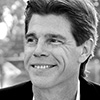Douglas Cole

No Patent On This
He kicked through the loose mounds of sawdust. He was not going to clean it up. It lay there beneath his table saw in the basement with the easels and the drafting tables. They were left-overs anyway. The orders were filled and he was through slogging up and down the coast trying to sell them to the universities and community colleges. A patent didn't mean much if you couldn't sell your product. Oh, a few colleges took them, and he'd busted his ass turning them out, hauling them up and down the coast. That's where all the sawdust came from, making those easels and drafting tables. But he was through with that, now.
Tools hung on the peg boards and lay along the workbench. Nope, he wasn't going to take any of those, either. Nothing. It was better that way.
He tromped up the stairs. The kids were in the living room in front of the screen. His wife was in the kitchen. He went up the back steps to the second floor and grabbed his leather bag out of the closet and began punching clothes into it. When the bag was full he zipped it shut. He looked around. A lot of clothes were left. Books, too. Books on Vermeer and Van Dyck, Rembrandt, and even one on Salvador Dali. On the wall was a Maxfield Parrish, woman on a swing, that deep blue of his. The woman looked like his wife.
He flipped open the cufflink box and poked at a few of the pearl ones, the gold, the fraternity ring with its green gemstone, who knew what kind. Nope, none of that was coming, either.
He took one deep breath and when he let it out it seemed like the sheets rippled on the unmade bed. He crossed the hall, and he glanced into his kids' rooms and took a snapshot with his mind, one of each room. Then he went downstairs.
She was at the sink. The cat was circling her legs. The dog was pawing at the screen door. The light was almost gone outside, just a deep blue glow, now, Maxfield Parrish blue. He took a snapshot of that, too.
"Well, I'm going."
She didn't even turn around. "Did you tell the kids?"
He took another deep breath, and this time, when he exhaled, the curtains on the windows seemed to sway. "No," he said. And that was it. And he wouldn't.
He went down the steps to the basement and out the side door to the driveway. He opened the door on the Volkswagen and threw his bag into the backseat. He climbed in and started the engine.
He snapped the lights on and cranked his arm over the seat and looked over his shoulder as he backed down the driveway. "What the?" he said, and he hit the brakes. His son was standing there in the red glow of the taillights, there in the middle of the driveway with his arms crossed. "Hey, what are you doing?" he said, but his son just stood there.
"You're not going," the boy said.
"Goddammit," he said, and he put on the emergency brake. But his wife appeared. Somehow she knew this was happening. She came down from the house and leaned over the boy and pulled him gently aside.
"You're not going!" the boy said again, stern, loud.
"What?" And he saw that she had the boy clear, standing in the grass off to the side. So he put the car in gear and slowly backed down the driveway, his wife there in the rays of the headlights, the boy there, too, just standing and glaring at him, his arms crossed over his chest.